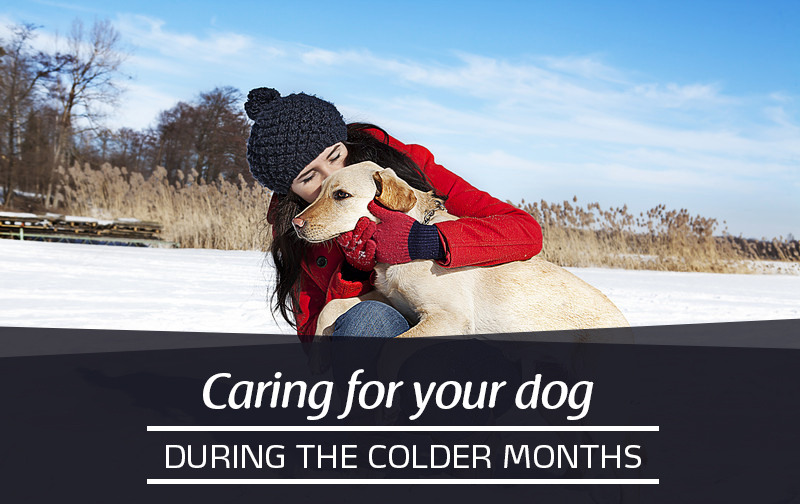Although the evenings are getting a little lighter we are still in the depths of winter with below zero temperatures and reduced daylight hours. This article is designed to give you some practical tips that will help you to look after your pet during the last few months of winter.
1. Exercise in winter
The short days with dark mornings and evenings may make exercising your dog a little harder and he may not receive the same amount of exercise that he would during the summer months.
It’s important to keep an eye on his weight and food intake as reduced exercise may lead to weight increase. Make it a routine to check his weight and cut down on total food intake if it seems to be on the increase.
Older dogs, just like humans can also suffer from stiff joints as a result of arthritic changes and these aches and pains can be worsened by cold, damp weather. There are a wide range of anti-inflammatory medications available from your vet which may help and also joint supplements such as glucosamine can be useful.
When walking your dog in the dark, a fluorescent jacket or collar can help your dog be seen more easily by traffic. You can also buy flashing lights which attach to the collar. A microchip is also a great idea (with up to date contact details) as should your pet be lost, it will help a speedy reunion. Microchips will become compulsory for all dogs in England and Wales from April 2016 onwards.
2. Ice hazards
A wintry scene is very pretty but walking your dog in ice and snow can cause some problems. Ice and snow can ball-up between the pads of the feet causing sores and lameness. Always check your dog’s feet on return home and give the areas between the pads a good wipe with a cloth and warm water to remove any ice, snow, grit, salt or dirt.
Frozen lakes and ponds are also a real hazard as the ice can be thin and unable to support the weight of your dog. There are deaths each year as well-meaning owners try to rescue their beloved pet. It’s a good idea to put your dog on a lead when near these areas.
3. Feeling the cold
Most dogs are well equipped to deal with any temperatures that the UK can throw at them. But some dogs with thin coats such as Chihuahuas and Greyhounds may well feel the cold just like us humans and would benefit from a coat when out walking in winter.
4. Beware poisons!
The winter months can expose your dog to some recognised poisons, one of which is antifreeze (ethylene glycol). This sweet tasting substance can leak from car radiators and it is very palatable to most dogs. Only a small amount can cause kidney damage which can be fatal. If you suspect that your dog may have consumed antifreeze then contact your vet without delay.
Also some houseplants left over from Christmas such as the Poinsettia have leaves which contain an irritant sap. These brightly coloured plants may prove interesting to dogs and although not likely to be fatal can lead to an unpleasant reaction if eaten. To be on the safe side keep these away from your pet.
By David Babington BVetMed MRCVS
Would you like to know more about dogs? Check our Canine Courses:
Canine courses
